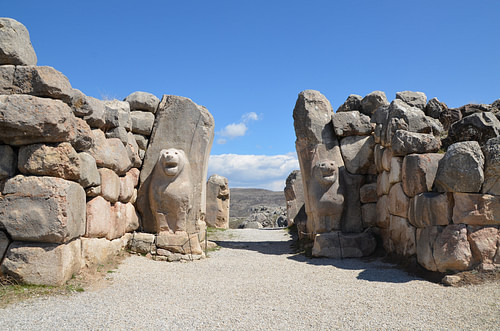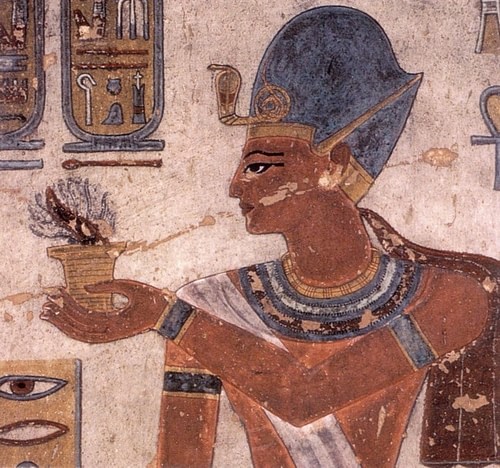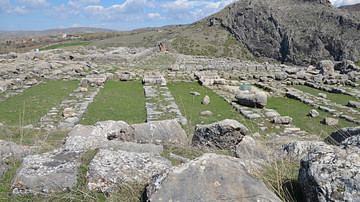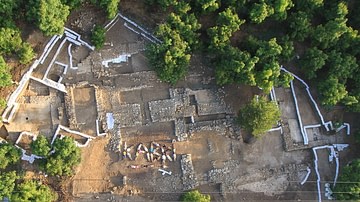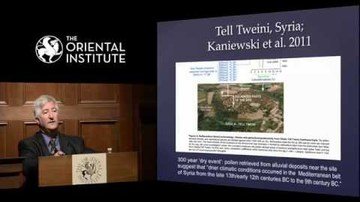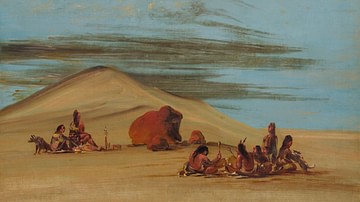The decline of the Late Bronze Age civilizations of the Mediterranean and Near East has puzzled historians and archaeologists for centuries. While many have ascribed the collapse of several civilizations to the enigmatic Sea Peoples, Professor Eric H. Cline, former Chair of the Department of Classical and Near Eastern Languages and Civilizations at George Washington University, presents a more complicated and nuanced scenario in his book, 1177 BC: The Year Civilization Collapsed.
In 2015 CE, Professor Eric H. Cline spoke to Ancient History Encyclopedia's James Blake Wiener about the circumstances that lead to the collapse of the cosmopolitan world of the Late Bronze Age.
JBW: Professor Cline, welcome to Ancient History Encyclopedia (AHE). I am pleased to speak to you about 1177 BC: The Year Civilization Collapsed as it has been on my reading list since its publication in 2014 CE. At last, I have read it!
In 1177 BC, you trace the social, economic, and cultural links between the civilizations of the Eastern Mediterranean and Near East — Egypt, Minoan Crete, Mycenaean Greece, the Hittite Empire, Mittani, Assyria, and Kassite Babylonia — and their cataclysmic demise during the late 2nd millennium BC. I suspect this was a book that you always wanted to write; however, I am keen to know what was it about the Bronze Age Collapse that intrigued you enough to write 1177 BC? Did it have anything to do with your prior archaeological work at Tel Kabri and Megiddo in Israel?
EHC: Actually, the impetus to write a book on this topic came from Mr. Rob Tempio at Princeton University Press. He came down to Washington, D.C. in the spring of 2007 CE and asked me if I would write a book on the collapse. I told him that what I really wanted to write was a book about what collapsed because the Late Bronze Age and the cultures and civilizations that were thriving in the Aegean and Eastern Mediterranean between about 1700 and 1200 BCE have always fascinated me.
So, we agreed that I would write about both, which is why the book begins and ends with considerations about the collapse, but the middle part of the book backtracks a few centuries in order to give the reader a good idea about what was there before it all went down in ruin. I like this approach because it puts the collapse into complete and proper context, giving the reader a precise idea of just how much was lost when the end came. And, no, writing 1177 BC had nothing to do with my work at either Kabri or Megiddo, but I am now at work on a book specifically about Megiddo that will be published by Princeton University Press. (I should add that a volume co-edited with Dr. Assaf Yasur-Landau on our excavations at Kabri is also in preparation, which will be published by Brill Publishers in the near future.)
JBW: You argue that these empires failed due to a combination of natural catastrophes like earthquakes and prolonged droughts, migration and foreign invasions, internal rebellions, and a sharp decline in international trade. This led in turn to political fragmentation and disintegration, as well as significant cultural change.
Professor Cline, why were earlier generations of scholars so keen to find a single explanation for the decline of Bronze Age civilizations? In the past, many scholars blamed the Sea Peoples, whose identity remains shrouded in mystery, for the collapse of various Bronze Age cultures. This is especially curious when taking into consideration the decline of inland empires like those of Kassite Babylonia, Elam, or Assyria, which were untouched by the Sea Peoples.
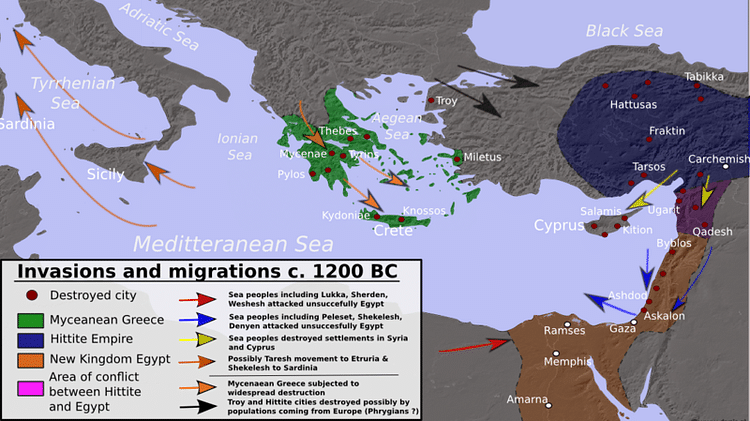
EHC: The urge to find a single explanation as the cause for such calamitous events seems to come from a modern human need for an easy explanation as often as possible. Certainly, some of the members of the general public who have left reviews of my book on Amazon seem to want that still and are miffed that I even-handedly go through the evidence and then conclude that there is no simple solution. I actually think that it is far more interesting to delve into a multicausal explanation, because in this case Occam's Razor (that the simplest solution is the most likely) just won't cut it. Although I think it seemed very logical to early scholars like Gaston Maspero and others to blame the Sea Peoples, they originally formulated that hypothesis based on Ramesses III's inscription at Medinet Habu and not much else. But, it has long been clear that it took much more than a single cause to bring down the Bronze Age civilizations. As you point out, the mere fact that the inland empires like Kassite Babylonia, Elam, and Assyria also declined shows that we cannot just blame the Sea Peoples for everything, much as one might want to do so.
Thus, my main thesis is that there must have been a 'perfect storm' of calamitous events at that turning point in order to cause the Late Bronze Age civilizations to collapse shortly after 1200 BCE. There is both direct and circumstantial evidence that there was climate change, drought and famine, earthquakes, invasions and internal rebellions, all at that approximate time. Of these, I would rank them in that specific order of importance: climate change; drought and famine; earthquakes; invaders; and internal rebellions. Although human beings have survived such catastrophes time and again when they come individually, such as rebuilding after an earthquake or living through a drought, what if they all occurred at once, or in quick succession?
It would be difficult to survive if all, or most, of the above calamities came at the same time or nearly so, as they seem to have done especially between about 1225 BCE and 1175 BCE. And that, I think, is why the Late Bronze Age civilizations came crashing down — they were not able to weather the 'perfect storm' of nearly simultaneous catastrophes, with each amplifying and multiplying the effects of the previous ones, piling on misfortune after misfortune until the entire system broke down. And then what we see is a systems' collapse, as empires and kingdoms that had flourished for centuries all came to an end, followed by the world's first Dark Age stretching from the Mediterranean to Mesopotamia.
JBW: 1177 BCE is the date when Ramesses III of Egypt (r. 1186-1155 BCE) defeated the Sea Peoples for a second time at the Battle of the Delta. (The Battle of Djahy, which pitted the Egyptians against the Sea Peoples occurred a few years earlier.) You characterize this as a “pyrrhic victory,” which symbolically ends the Bronze Age networks of trade, power, and culture. After Egypt battled for its very existence and prevailed against the onslaught of the Sea Peoples, it too entered a period of marked decline.
Yet within 1177 BC, you claim that decline began as early as c. 1250 BCE and as late as c. 1130 BCE, depending on geographical location. How important then is the date 1177 BCE in our understanding of the Bronze Age's termination? Why did you select this date as the title of your book?
EHC: It did indeed take about a century for everything to collapse, but 1177 BCE is a good reference point, for it is in that year that the Sea Peoples invaded Egypt for the second time, as you say, and by then many of the cities across Canaan, Asia Minor, and Greece were already in decline if not already destroyed. Therefore, I use '1177 BCE' as shorthand for the entire Late Bronze Age Collapse, just as we commonly use '476 CE' as shorthand for the fall of the Roman Empire; we know that neither took place entirely in exactly that year and yet we understand that those dates are representative. To my mind, as I say in the book, 1177 BCE “is a reasonable benchmark and allows us to put a finite date on a rather elusive pivotal moment and the end of an age.” Perhaps a better way to phrase it, as I say a sentence or two later in the book, is that “the world in 1200 BCE was quite different from that of 1100 BCE and completely different from that of 1000 BCE,” but that is not as snappy a title.
JBW: Aside from citing the latest archaeological research, you utilize some remarkable primary sources in 1177 BC, including meticulous diplomatic correspondence drawn from the Amarna Letters, the Pylos and Knossos Linear B tablets from Greece, and texts from Ugarit. Of these, I was fascinated by the texts from Ugarit. Might you offer a word or two about the texts from the city-state of Ugarit and how they were important to your research presented in 1177 BC, Professor Cline?
EHC: I, too, am fascinated by the texts from Ugarit. Throughout most of my career, I have mainly studied the royal texts from Mari in Syria, dated back to c. 1800 BCE, and the royal texts from Amarna in Egypt, dated to c. 1350 BCE. However, the texts from Ugarit, especially those which come from the 14th through 12th centuries BCE, shed light not just on royal activities, but also on the activities of private merchants and even private individuals. There are several archives that we know of from Ugarit, coming from the royal palace as well as private houses belonging to wealthy merchants named “Urtenu,” “Yabninu,” and “Rapanu.”
The tablets first began to be recovered in the 1950s CE, with the most recent coming to light from 1994-2002 CE. We find out all sorts of things from them, like the fact that a ship was sent from Ugarit to Crete in about 1260 BCE by a different merchant named “Sinaranu.” It was scheduled to bring back olive oil, grain, and beer to Ugarit. We are told specifically that it would be exempt from import taxes when it got back — I think it might be the first recorded case of a corporate tax break that we know of! The texts from Ugarit also shed light on the interconnections of the time, allowing us to construct diagrams and do social network analyses showing the relationships between individuals both in the city and in distant kingdoms.
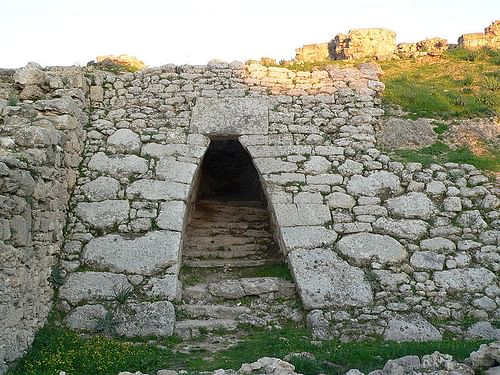
Even more important from the standpoint of the collapse, though, is the fact that, first of all, the tablets and letters continue right up until the very end of the city, so that we get a picture of what must have been almost the final days, sometime between 1190 and 1185 BCE. Secondly, the tablets and letters describe enemy ships approaching, destruction of the fields, drought, and famine. This is written, textual evidence of a multitude of calamities, not just inference from archaeological remains! Unfortunately, we are not given any specifics as to who the invaders or the enemy ships might be, so we do not know if these are the Sea Peoples or not, though there is a good chance that they are.
JBW: Professor Cline, I hope that you will indulge me with my next question: who do you think were the Sea Peoples? Based on what we know, the Sea Peoples were a band of people, of mixed origins, who migrated, settled, and raided the coast of the Eastern Mediterranean. Do you have any additional thoughts? Will we ever unmask their true identity?
EHC: This is an excellent question, but we do not know the answer for certain. I think the origin for some of them was the region of Sicily, Sardinia, and southern Italy (some of the groups are called the Shekelesh and the Shardana, which sound similar), but others most likely joined in along the way, as they moved from west to east across the Mediterranean. Consequently, there may have been others from what is present-day Greece and Turkey among the Sea Peoples as well.

We have yet to definitively identify a homeland for them, but I think that day will eventually come. It may be a matter of creating a check-list of criteria that we would need to look for, in order to figure out where to dig or otherwise look for a site or sites from which they could have come, but once we start looking seriously, I will not at all be surprised if evidence eventually turns up.
JBW: I wanted to ask you if any polities or groups benefited from the Late Bronze Age Collapse? The Phoenician city-states and the Aramaeans seem to have fared better than many others.
EHC: Well, the main legacy seems have been the Philistines and their culture, for the group among the Sea Peoples that the Egyptians called the Peleset are probably the group that we know as the Philistines from the Bible. They seem to have settled down in the region of Canaan and perhaps assimilated with the locals, just before the rise of Israel. But, other than them, yes, also the Aramaeans, but the Phoenicians and the Israelites seem to have benefited the most from the collapse of the Bronze Age.
As I see it, all of these groups were able to really 'set up shop,' as it were, in the regions of Canaan from which the Egyptians and Hittites had both just withdrawn — especially in what is now modern Israel, Lebanon, and Syria. To put it in modern terms, I think that the Israelites, Phoenicians, Aramaeans, and Philistines benefited from the 'power vacuum' that was created in this area when the Great Powers were laid low. There was no way that any of them could have established a foothold in this area if the Egyptians, Hittites, and Canaanites had still been as powerful as they were even in the 13th century BCE. The calamitous events at the beginning of the 12th century BCE made all the difference.
JBW: Professor Cline, I thank you for speaking with me about 1177 BC, and I wish you many happy adventures in research! Perhaps we shall speak in the future about your next book?
EHC: It would be my pleasure to do so, James! Thanks for inviting me to be interviewed about 1177 BC for Ancient History Encyclopedia.
Professor Eric H. Cline is Professor of Classics and Anthropology, the former Chair of the Department of Classical and Near Eastern Languages and Civilizations, and the current Director of the GWU Capitol Archaeological Institute. He is a National Geographic Explorer, a Fulbright scholar, and an award-winning teacher and author. He has also served as the advisor to the undergraduate archaeology majors at GW for the past decade and has overseen the graduation of 132 majors since 2001 CE, with nearly half going on to leading graduate schools in archaeology and related fields, including Harvard, Yale, Cornell, Johns Hopkins, Berkeley, Oxford, Cambridge, and University College London. An archaeologist and ancient historian by training, Dr. Cline's primary fields of study are biblical archaeology, the military history of the Mediterranean world from antiquity to present, and the international connections between Greece, Egypt, and the Near East during the Late Bronze Age (1700-1100 BCE). Dr. Cline is an experienced and active field archaeologist, with 30 seasons of excavation and survey to his credit since 1980 CE in Israel, Egypt, Jordan, Cyprus, Greece, Crete, and the United States; he currently co-directs the excavations at both Megiddo (Armageddon) and Tel Kabri in Israel. 1177 BC: The Year Civilization Collapsed has already been translated into French, Italian, Spanish, and Dutch, with translations into six more languages soon to appear. It has won the 2014 CE “Award for the Best Popular Book” from the American Schools of Oriental Research; was named as one of the New York Post's Best Books of 2014 CE; been on the national bestseller lists in both Canada and France; received Honorable Mention for the 2015 CE PROSE Award in Archaeology & Anthropology from the Association of American Publishers and was under consideration for the 2015 CE Pulitzer Prize.

